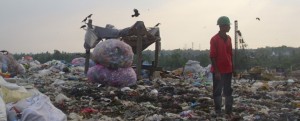News
Stinking, filthy mess!
Bags full of garbage strewn across the road, crows peck away and flies swarm the area—these are the sights that greet passersby. This is amidst the recently paved streets and the newly constructed jogging tracks along the Mattakkuliya road, Elakanda.

Karadiyana dump site in Panadura. Pic by Rheka Tharangani
The garbage trucks have not visited this area for nearly a month, the Sunday Times learns. As a result the area residents dump their trash on the streets. Bags of garbage are also left by the side of the Hendala- Elakanda road.
The situation is no different in other parts of the Western Province, with Kalutara, Panadura, Dehiwala, Mount Lavinia and certain areas of Colombo facing similar garbage problems. The authorities meanwhile maintain that there are no suitable dumping sites for the refuse.
On Wednesday, 17 people were apprehended while dumping garbage in the Hamilton Canal and Kelani River, according to Police.
Meanwhile representatives of local councils had discussed the problem of garbage disposal with Local Government and Provincial Councils Minister Faiszer Musthapha. On Monday, the Western Provincial Council also held a special meeting to discuss the issue.
Mr. Musthapha told the Sunday Times the problem had become a national issue and President Maithripala Sirisena wants to bring waste disposal under one authority.
Representatives of local councils had pointed out that the environmental police unit did not function properly in these areas. Minister Musthapha said he had agreed to discuss with the police chief steps to be taken to strengthen the unit.
Environmental Police ASP B.W.W Rajapakse, however, said people were compelled to dump their garbage on the roads, because the local councils were not doing their job properly.
“If they don’t have a place to dump the dirt, then we cannot harass the people or make arrests when they dump it on the roads,” he said.
In a move to find a solution, some local authorities have adopted recycling methods. Most of the decomposing waste is given out to private companies to be composted, the Sunday Times learns.
In these areas residents have been told to separate recyclable waste from the non recyclable. However this has also caused problems, with the garbage collectors refusing to take the refuse if residents have not separated their garbage.
A Mount Lavinia resident living in a condominium of 16 units said, with common bins in place, it was difficult for everyone to separate their waste.
He said following a meeting among the condominium residents three labeled bins were put in place. “We did the best we could.
But when the collectors came they opened the garbage on our garage floor and found two small yogurt cups, a toffee wrapper and a bread bag with the biodegradable waste and refused to take the garbage, warning us that they will keep it to rot for weeks,” he said.
He said now residents have resorted to burning everything in an empty block creating health problems.
The Dehiwala- Mount Lavinia Municipal Council has received several complaints regarding the refusal of collectors to take the waste, a council official said.
“The collected garbage is delivered to a dump that is privately owned. If the garbage is not separated then those at the dump site refuse to take it. When this happens the collectors have nowhere else to take the trash, the official said.
“They are therefore careful when collecting the trash. But when the garbage is not collected, the people dump it on the streets.”
The Kalutara Municipal Council is also following a similar practice with their waste disposal. According to a Public Health Inspector (PHI) from the Council, degradable waste is collected three times a week and taken to a compost yard in Nagoda.
The non bio-degradable waste is collected once a week.
However he admitted there were shortcomings when it came to collecting dirt from the Kalutara Pradeshiya Sabha areas and, as a result, people were dumping garbage by the roadside.
According to former Wattala Pradeshiya Sabha member Malcolm Perera, at present the council does not have a place to dump the garbage.
Earlier, the garbage was dumped opposite the Dikkowita fisheries harbour but this was stopped on an order of then Economic Development Minister Basil Rajapaksa. The garbage was then dumped on a five-acre private plot of land in Kerawalapitiya, however this too has stopped.
The system of separating the waste had also been abandoned primarily because of the limited number of tractors and the lack of manpower, he said.
Meanwhile a PHI from the Panadura Urban Council said the council had abandoned the plan to collect garbage separately.
This was because the compost site that used to take the waste had refused to accept any more, regardless of whether it was separated or not.
According to him, the Council had strictly implemented the practice of residents separating their waste, but after the compost yard’s refusal to accept the garbage all the garbage is mixed together when collected.
He said earlier the council used to dump the garbage at the Karadiyana dump site. However this was stopped following a court order in 2013.
Now that the privately owned compost site, too, had refused to accept the garbage the council does not have a place to dump the areas waste.
The delay in holding elections to some local councils has also hampered political decisions being taken regarding the garbage problem further exacerbating the issue, the Sunday Times learns.

